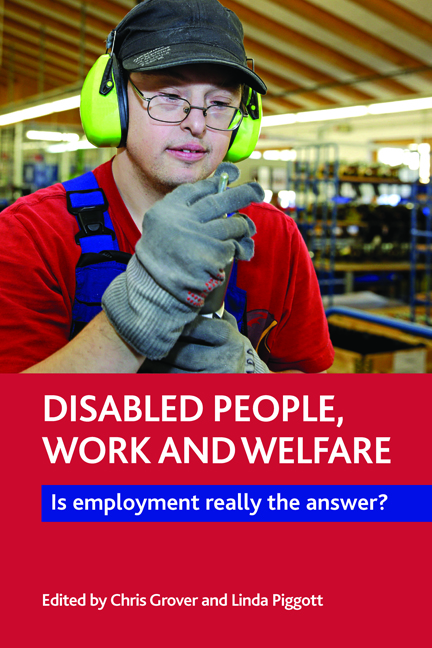Book contents
- Frontmatter
- Dedication
- Contents
- List of tables and figures
- List of abbreviations
- Notes on contributors
- Acknowledgements
- one Disabled people, work and welfare
- Part One Changing constructions of disability and welfare
- Part Two Social policy, work and disabled people
- Part Three Assistance and access to paid work
- Part Four Alternatives to, and validated lives beyond, paid work
- Part Five Conclusion
- Index
nine - Employment experiences and outcomes of young people in Scotland who are deaf or hard of hearing: intersections of deafness and social class
Published online by Cambridge University Press: 11 March 2022
- Frontmatter
- Dedication
- Contents
- List of tables and figures
- List of abbreviations
- Notes on contributors
- Acknowledgements
- one Disabled people, work and welfare
- Part One Changing constructions of disability and welfare
- Part Two Social policy, work and disabled people
- Part Three Assistance and access to paid work
- Part Four Alternatives to, and validated lives beyond, paid work
- Part Five Conclusion
- Index
Summary
Introduction
The financial crash of 2008 has had a particularly negative effect on young people born in the 1980s, especially those from poorer backgrounds (Hills, 2013). The consequences have been dire for young people living in poverty with additional support needs, which are often a consequence of social disadvantage. This chapter focuses on the employment experiences and outcomes of young people who are deaf or hard of hearing (DHH), who make up approximately 0.3% of the total population of young people in Scotland (Scottish Government, 2013). Whereas much analysis of the experiences of disabled people treats those with particular impairments as homogeneous groups, this chapter attempts to unpick the relationship between social class and labour market outcomes for people who are DHH.
Drawing on recent research into the post-school transitions of young people who are DHH (Fordyce et al, 2013a), we discuss the role played by social class in their employment outcomes as depicted by findings from interviews with young people who are DHH in Scotland.
The significance of educational qualifications in the labour market outcomes of disabled people
Young disabled people occupy an increasingly precarious position in the labour market due to their disability status (Meager and Higgins, 2011) and the generally high youth unemployment in recent years (Hills, 2013). Although the employment rates of disabled people have slightly increased in the last decade (Sayce, 2011), they still remain approximately 30 percentage points lower than those of non-disabled people (Office for Disability Issues, 2013). The reasons for this include:
• lower qualifications (Burchardt, 2005);
• lower participation rates in post-16 education, training and employment (Directorate-General for Education and Culture, 2012);
• employer discrimination (Jones and Sloane, 2010; Meager and Higgins, 2011).
Research suggests that the labour market penalty associated with lower qualifications is higher for disabled than non-disabled people. Berthoud (2007), for example, carried out a secondary analysis of data from the General Household Survey and found that between 1974 and 2003 the employment rates of disabled men with no qualifications decreased by half (from 77% to 38%), while those of non-disabled men with no qualifications decreased by only 10 percentage points (from 95% to 85%). In comparison, disabled men with post-secondary qualifications faced a less dramatic, albeit marked reduction in employment rates over the same years (from 93% to 75%). This indicates that higher educational qualifications have a mitigating effect on the disadvantage associated with disability.
- Type
- Chapter
- Information
- Disabled People, Work and WelfareIs Employment Really the Answer?, pp. 163 - 180Publisher: Bristol University PressPrint publication year: 2015



